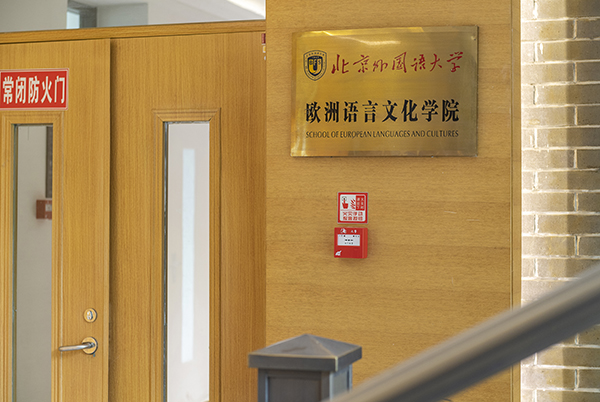- Research
- Research Centers
- Journals
- Admission
- Introduction
- Programs
- Application
- Alumni & Giving
- Alumni Club
- Giving

The School of European Languages and Cultures at Beijing Foreign Studies University traces its roots back to the 1950s. The establishment of its various majors has been closely tied to China’s diplomatic endeavors and economic development, and many of the school’s graduates have gone on to become distinguished diplomats, scholars and experts.
The school is a comprehensive teaching and research institution for less commonly taught European languages, offering the largest number of such language programs in China, along with a full range of undergraduate, master’s and doctoral degrees. With a strong faculty of over 90 full-time Chinese and international teachers, including more than 20 foreign faculty members, the school has launched programs in 25 languages, namely: Polish, Czech, Romanian, Hungarian, Bulgarian, Albanian, Italian, Swedish, Serbian, Finnish, Dutch, Slovak, Croatian, Greek, Norwegian, Danish, Icelandic, Slovenian, Estonian, Latvian, Lithuanian, Maltese, Latin, Macedonian and Luxembourgish. It boasts 16 national first-class undergraduate program construction sites and two Beijing municipal ones.
Generations of dedicated faculty members have worked tirelessly to shape the school’s distinctive academic strengths and fine scholarly traditions. Since 1984, the school has admitted master’s students. In 1998, the sub-discipline of European Languages and Literatures was approved for the establishment of master’s and doctoral programs, and in 2010, it was designated as a key discipline in Beijing. The school has launched academic journals such as Eastern Europe and the Journal of European Languages and Cultures. It also hosts 13 country and area studies training bases and registered research centers under the Ministry of Education, focusing on research on Central and Eastern Europe, the Balkans, Italy, Poland, Hungary, Romania, Bulgaria, Greece, Albania, Sweden, Denmark, Finland and Iceland.
For more than 70 years, the school has remained committed to teaching and researching less commonly taught European languages. Its academic work spans literature, linguistics and translation studies, and it has continued to expand research into the politics, economy, education, society and culture of target countries. These efforts have produced significant scholarly achievements and provided strong support for nationwide education in less commonly taught European languages. The school has trained more than 3,000 high-caliber professionals in this field, contributing to the friendly exchanges between China and Europe.
In the new era, the school is building on its distinctive strengths in less commonly taught European languages and related disciplines. It is consolidating its foundation in undergraduate education, enhancing the quality of graduate training, promoting interdisciplinary integration, expanding educational openness and deepening international exchanges and cooperation. The school is also advancing the application of digital and intelligent technologies in foreign language teaching and research, strengthening fundamental disciplines such as classics and foreign languages and literatures, and integrating resources to reinforce the development of key disciplines like country and area studies and European studies, thus achieving new progress in promoting high-quality development in the new era.